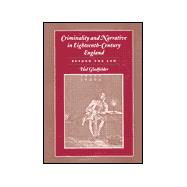
Note: Supplemental materials are not guaranteed with Rental or Used book purchases.
Purchase Benefits
Looking to rent a book? Rent Criminality and Narrative in Eighteenth-Century England : Beyond the Law [ISBN: 9780801866081] for the semester, quarter, and short term or search our site for other textbooks by Gladfelder, Hal. Renting a textbook can save you up to 90% from the cost of buying.
Hal Gladfelder is an assistant professor of English at the University of Rochester.
| Preface | ix | ||||
| Introduction | 1 | (18) | |||
| PART I Criminal Representations | 19 | (74) | |||
|
21 | (12) | |||
|
33 | (12) | |||
|
45 | (13) | |||
|
58 | (14) | |||
|
72 | (21) | |||
| PART II Crime and Identity: Defoe in the 1720s | 93 | (58) | |||
|
102 | (11) | |||
|
113 | (18) | |||
|
131 | (20) | |||
| PART III The Judge and the Author: Fielding in Midcentury | 151 | (58) | |||
|
159 | (15) | |||
|
174 | (13) | |||
|
187 | (22) | |||
| Epilogue: English Radicalism and the Literature of Crime | 209 | (16) | |||
| Notes | 225 | (38) | |||
| Bibliography | 263 | (12) | |||
| Index | 275 |
The New copy of this book will include any supplemental materials advertised. Please check the title of the book to determine if it should include any access cards, study guides, lab manuals, CDs, etc.
The Used, Rental and eBook copies of this book are not guaranteed to include any supplemental materials. Typically, only the book itself is included. This is true even if the title states it includes any access cards, study guides, lab manuals, CDs, etc.